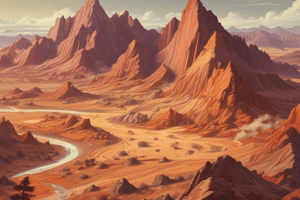Podcast
Questions and Answers
What is the primary focus of the field of geology?
What is the primary focus of the field of geology?
- The study of the Earth's living organisms
- The study of the Earth's oceans
- The study of the Earth's atmosphere
- The study of the Earth's physical structure, composition, and processes (correct)
Which branch of geology studies the three-dimensional distribution of rocks and their relationships?
Which branch of geology studies the three-dimensional distribution of rocks and their relationships?
- Geochemistry
- Petrology
- Structural Geology (correct)
- Geomorphology
What type of rock is formed from the cooling and solidification of molten magma or lava?
What type of rock is formed from the cooling and solidification of molten magma or lava?
- Geochemical
- Metamorphic
- Sedimentary
- Igneous (correct)
What is the primary process responsible for the creation of mountains, volcanoes, and earthquakes?
What is the primary process responsible for the creation of mountains, volcanoes, and earthquakes?
What is the largest unit of time in the geological time scale?
What is the largest unit of time in the geological time scale?
Which of the following is NOT a branch of geology?
Which of the following is NOT a branch of geology?
What is the process of settling of sediments and rocks in a new location?
What is the process of settling of sediments and rocks in a new location?
What type of rock is formed from compressed and cemented sediments?
What type of rock is formed from compressed and cemented sediments?
Flashcards are hidden until you start studying
Study Notes
Geology
Definition and Scope
- Geology is the scientific study of the Earth's physical structure, composition, and processes
- Encompasses the study of rocks, minerals, landforms, and natural phenomena such as earthquakes and volcanoes
Branches of Geology
- Petrology: study of rocks and their composition
- Mineralogy: study of minerals and their properties
- Structural Geology: study of the three-dimensional distribution of rocks and their relationships
- Geomorphology: study of the shape and features of the Earth's surface
- Geophysics: study of the Earth's internal and external physical processes
- Geochemistry: study of the chemical composition of the Earth and its processes
Rock Types
- Igneous: formed from molten magma or lava
- Intrusive: forms below the Earth's surface
- Extrusive: forms above the Earth's surface
- Sedimentary: formed from compressed and cemented sediments
- Metamorphic: formed from altered existing rocks under high pressure and temperature
Geological Processes
- Plate Tectonics: movement of the Earth's lithosphere (outer layer) leading to the creation of mountains, volcanoes, and earthquakes
- Weathering: breakdown of rocks into smaller particles
- Erosion: removal of rocks and soil through natural forces such as wind and water
- Deposition: settling of sediments and rocks in a new location
Geological Time Scale
- Eons: largest unit of time, divided into:
- Phanerozoic: visible life present
- Proterozoic: complex life present
- Archean: early life present
- Hadean: primordial Earth
- Eras: subdivisions of eons, divided into:
- Periods: further subdivisions of eras
- Epochs: smallest unit of time, used to date specific events
Geology
Definition and Scope
- Scientific study of the Earth's physical structure, composition, and processes
- Includes the study of rocks, minerals, landforms, and natural phenomena like earthquakes and volcanoes
Branches of Geology
Petrology
- Study of rocks and their composition
Mineralogy
- Study of minerals and their properties
Structural Geology
- Study of the three-dimensional distribution of rocks and their relationships
Geomorphology
- Study of the shape and features of the Earth's surface
Geophysics
- Study of the Earth's internal and external physical processes
Geochemistry
- Study of the chemical composition of the Earth and its processes
Rock Types
Igneous Rocks
- Formed from molten magma or lava
- Divided into:
- Intrusive: forms below the Earth's surface
- Extrusive: forms above the Earth's surface
Sedimentary Rocks
- Formed from compressed and cemented sediments
Metamorphic Rocks
- Formed from altered existing rocks under high pressure and temperature
Geological Processes
Plate Tectonics
- Movement of the Earth's lithosphere leading to the creation of mountains, volcanoes, and earthquakes
Weathering
- Breakdown of rocks into smaller particles
Erosion
- Removal of rocks and soil through natural forces like wind and water
Deposition
- Settling of sediments and rocks in a new location
Geological Time Scale
Eons
- Largest unit of time, divided into:
- Phanerozoic: visible life present
- Proterozoic: complex life present
- Archean: early life present
- Hadean: primordial Earth
Eras
- Subdivisions of eons, divided into:
- Periods: further subdivisions of eras
- Epochs: smallest unit of time, used to date specific events
Studying That Suits You
Use AI to generate personalized quizzes and flashcards to suit your learning preferences.




